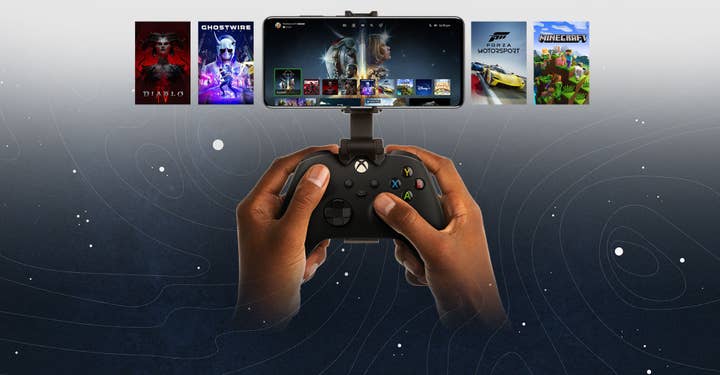Multiplatform Microsoft and a very different future for consoles | This Week in Business
Get the bingo card ready because we're talking about unsustainable AAA development, "consoles are doomed" predictions, retro handhelds, and the 3DO
This Week in Business is our weekly recap column, a collection of stats and quotes from recent stories presented with a dash of opinion (sometimes more than a dash) and intended to shed light on various trends. Check every Friday for a new entry.
Microsoft dropped a bombshell yesterday, confirming recent reports that it would be going multiplatform, bringing a quartet of first-party games to rival consoles in the near future.
It didn't say which four games those would be, but it ruled out Starfield and Indiana Jones, which had been named in those unconfirmed reports. Between what was revealed and what was reported, it seems likely we're looking at Sea of Thieves, Hi-Fi Rush, Pentiment, and Grounded.
Naturally, everyone responded to this news in a level-headed and emotionally balanced way, because this industry has always conducted itself with the utmost responsibility in ensuring that its customers' relationship with the brands and companies they support is at its heart a healthy one.
Or, you know, maybe the opposite of all that happened.
Regardless, it's a Big Deal, because now we're going to have one platform holder making games for a platform owned by a competitor! This NEVER happens.
I mean, we knew it would be happening, because Microsoft signed those deals to bring Call of Duty to a bunch of places (namely PlayStation, Steam and Nintendo consoles) so the Activision Blizzard acquisition could go through. And it's not like they were suddenly going to pull Diablo 4 off PS5 or Overwatch 2 off Switch.
And sure, Microsoft published Psychonauts 2 and Pillars of Eternity and Ghostwire Tokyo and Deathloop on Sony's platforms (with timed exclusivity in the latter two cases, even), but those don't count because they were already in the works when Microsoft acquired the developers of those games.
And yeah, Microsoft already brought one of its exclusives to rival platforms when it published Ori and the Blind Forest: Definitive Edition on Switch when it absolutely did not have to. (Cuphead and Ori and the Will o' the Wisps were technically published on Switch by Studio MDHR and iam8bit, respectively, and I can't imagine those ports happening without Microsoft's blessing.)
And I grant you, Minecraft is already on everything.
But games like Minecraft and Call of Duty are just so massive you'd lose money keeping them exclusive so it makes no sense to limit them to one platform!
And games like Ori and Cuphead are so small they won't move the needle so it makes no sense to limit them to one platform!
That's actually Microsoft's on-the-record position on this, too. During the Activision Blizzard acquisition process, Microsoft revealed to UK regulators that the only games worth keeping exclusive are games like... Redfall?
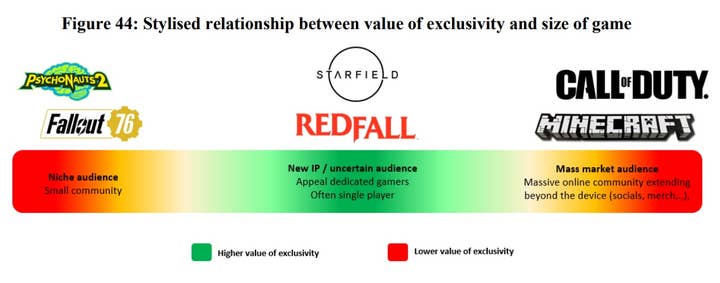
And that's why this even counts as news. The only thing new about it is that Microsoft is expanding its multi-platform offerings ever-so-slightly into that Goldilocks zone for exclusivity, offering more of its mid-tier catalog to players on other platforms, and chipping away at the catalog of Xbox exclusives that people would presumably consider when choosing one system over another.
If you buy a PS5 now, you can get all of Sony's big-name blockbusters as well as a swath of Microsoft's biggest and/or most interesting offerings, which is a nice best-of-both-worlds sales pitch.
On the other hand, if you buy an Xbox now, you get a bunch of stuff you could play just as easily on other formats, and a handful of exclusives from the third-best platform-holder (of three) when it comes to making great exclusives.
Game Pass has some appeal, for sure, because you can play those exclusives day one (or perhaps day six) without worrying that you wasted $70 on a bad game, but that's been true for years now and hasn't served as a compelling enough argument over a PS5 purchase even when Microsoft was devoting exclusives like Gears 5 and Halo Infinite to it.
Does adding perennial chart-topping franchise Call of Duty into Game Pass at launch change things? Maybe, but I'm still clinging to my "Call of Duty has peaked" belief no matter how many times I get it wrong. And given the reception to Modern Warfare 3 last year and how many times Microsoft has accidentally applied the "embrace, extend, and extinguish" strategy to acquired developers, maybe this time it's happening for real!
It's a little surprising to see the company backing off exclusivity in any way after a years-long dry spell that saw one (1) credible system-seller
Now on the one hand, Game Pass' subscriber base has grown at a slower-than-expected rate over the past few years.
On the other, the entire story around Xbox for years has been Microsoft's inability to continuously support the service with big-name exclusives, and it's a little surprising to see the company backing off exclusivity in any way after a years-long dry spell that saw one (1) credible system-seller in Starfield, especially with Indiana Jones, The Elder Scrolls, and whatever else still on the way and Sony taking a year off from major releases.
So why is Microsoft doing this? I feel like I should have a more complicated reason for you than "money," but, um…. Money.
Exclusives have always been a bit of a leap of faith for platform holders who have to judge whether the money they generate in system sales and keeping the ecosystem healthy and top-of-mind for customers is worth the trade-off of limiting their addressable market to the system's installed base.
It's a tale as old as time, or at least as old as Xbox. At the risk of violating the turf of This Week in Business sibling column 10 Years Ago This Month, let's revisit a February 2014 interview with former Microsoft VP Ed Fries reflecting on the pressure he was feeling from superiors at the company in 2003, just a couple years after the launch of Microsoft's original console.
QUOTE | "So the conversation kind of goes, 'You're not making enough money.' And I'd say something ridiculous like, 'Well we could make more money if you'd allow me to put Halo on PlayStation.' 'You can't do that,' they say of course. I say, 'Well stop bugging me about making more money then.' So you're kind of in this box where you're really expected to do platform-leading work but if you're also trying to make a profit it's very difficult with the size of the market you can address when you're a minority share console." – Ed Fries recalling corporate pressure to improve the bottom line in 2003.
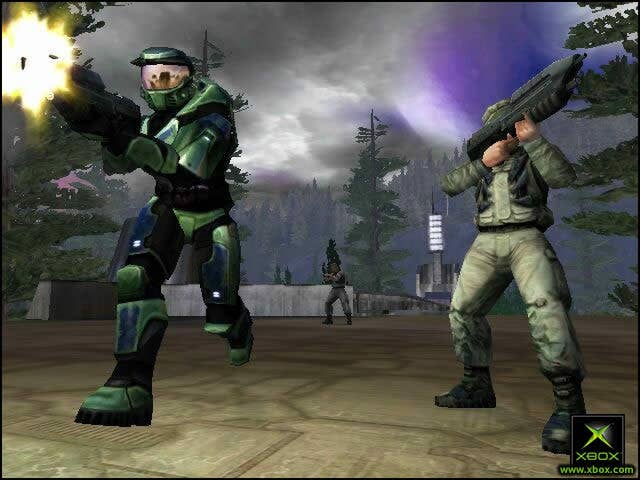
Usually the decision on exclusivity is not that tough a call to make because it's kind of baked into the platform holder business model. As Fries noted, "of course" Microsoft scoffed at the idea of putting Halo on PlayStation.
Two decades later, Xbox is again a minority share console, and its options for changing the pecking order are slim
But two decades later, Xbox is again a minority share console, and its options for changing the pecking order are slim.
QUOTE | "It's just not true that if we go off and build great games, all of a sudden you're going to see console share shift in some dramatic way. We lost the worst generation to lose in the Xbox One generation, where everybody built their digital library of games… There is no world where Starfield is an 11 out of 10 and people are selling their PS5s. That's not going to happen." – Phil Spencer in an interview last year, admitting Microsoft can't compete with Sony and Nintendo by using a traditional platform holder strategy.
When it comes time for someone to pick a next-gen system and they're already deeply invested in one ecosystem where all the downloadable games they purchased can be played on the new system and their online friends list is all there and there are basically no generational switching costs, there's not much you can do to win them over.
It's doubly tough if you won't (or can't) make your Call of Duty and Minecraft-level games exclusive and your competition isn't helpfully shooting itself in the foot multiple times over, like Sony did to give Xbox its first big break by making the PS3 outrageously expensive, difficult to develop for, late to the party, and with a launch line-up that had to lean way too hard on Genji: Days of the Blade and Untold Legends: Dark Kingdom.
And then there's the games-as-a-service factor, which Spencer also touched on in that same interview. He noted that the current generation is the first one where massive numbers of gamers are still playing last generation's hits, specifically name-dropping Minecraft, Roblox, and Fortnite. And boy howdy, are they ever.
STAT | 31% - The number of active Xbox users in December who played Fortnite at least once during the month, according to Circana. For PlayStation users, it was 36%.
Games-as-a-service, and much of the entire industry these days, is driven by engagement like that. The upfront fee for these games is great and publishers aren't eager to do away with it entirely, but the real business is about keeping people around month after month, year after year, so you can monetize them again and again and again. And just like the free-to-play games that pointed the industry in this direction, games-as-a-service titles benefit immensely from having the largest player base possible, making multiplatform releases with cross-platform play almost a no-brainer decision.
And even if it's incredibly difficult to launch a title that succeeds in the crowded games-as-a-service market, the potential payoff of an endless stream of income like that to fuel ongoing development seems less risky to many companies than spending nine figures making one game every six years and hoping it somehow sells enough to pay for the next six years of overhead.
PlayStation has been so dominant that it's getting Xbox exclusives now, but Sony is still disappointed with the returns on its investment
If you want to know how tough that latter strategy is to pull off, look at Sony. PlayStation has been so dominant that it's getting Xbox exclusives now, but Sony is still disappointed with the returns on its investment.
QUOTE | "People who work in the studios have very high motivation. They're very highly motivated. They're very good people. And they're very creative people. They have great creative minds. And they also have knowledge about live streaming. However, having said that, when it comes to the business itself, I think there is room for improvement. And that's got to do about how to use the money or about the schedule of development or how to fulfill one's accountability towards development, et cetera." – In a briefing about the company's earnings this week, Sony president, COO and CFO Hiroki Totoki criticizes the company's first-party studios for not being more profitable, as reported by Gematsu.
It's understandable that Microsoft would look at its distant third-place console business and conclude that drastic changes were necessary, but Sony has been making some big changes of its own, despite the PS5 being an unqualified success virtually matching the sales pace of the PS4 several years into its lifespan.
STAT | 12% - The percent of Sony's PS5 development spend dedicated to live service games, according to the company's "Road to Profitable Transformation" document released in mid-2022.
STAT | 55% - Sony's targeted development spend on live service games for the end of its fiscal year 2025, according to the same document.
Sony built the PS4 and PS5 on a succession of largely single-player blockbusters, your Gods of War, your Lasts of Uses, your Spiders-Men. If it wanted to keep on that path and continue to dominate the high-end console market, it probably could have. Even a few of the hypothetical 11/10 Xbox exclusives Spencer mentioned would be more likely to sell people on Xbox as a secondary system than convert them from PS5 entirely.
Yet Sony was so unenthused about the status quo that it spent $3.6 billion to acquire Bungie to kickstart that live service games development shift.
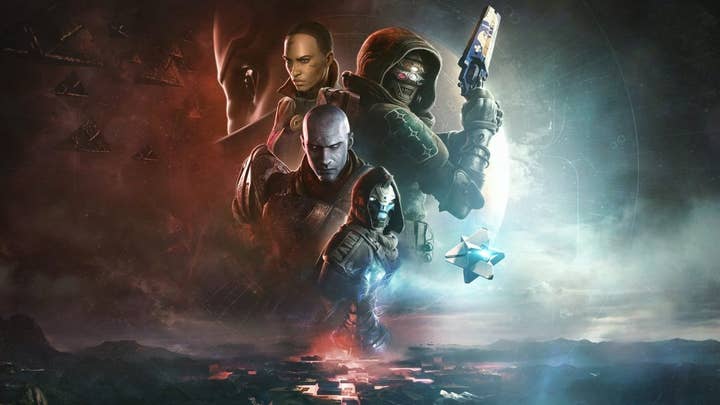
QUOTE | "I've been on record talking about increasing the size of the PlayStation community, and expanding beyond our historic console heartland. This can take many forms. And definitely one of the main ones is the ability for the wonderful games that we've been making over the past 25 years to be enjoyed in different places and played in different ways. We are starting to go multiplatform, you've seen that. We have an aggressive road map with live services." – In an interview with us around the Bungie deal, PlayStation CEO Jim Ryan coins the very cursed phrase "our historic console heartland" while expressing a desire to grow PlayStation beyond the qualities that gave it market leadership in the first place.
Destiny was part of that multiplatform push for Sony, as the company continues to allow Bungie's free-to-play shooter on Xbox, right alongside each year's MLB: The Show installment going back to 2020. It has also released a number of its PS4 and PS5 blockbusters on PC, and while they have tended to lag their console counterparts' launches by some time, last week saw Sony publish Helldivers 2 on PC and PS5 day-and-date with one another, to strong early reviews.
And this brings us to our second 10 Years Ago This Month crossover point, as we are forced to reckon with one particularly persistent prediction that has been kicking around the industry in various forms for about 20 years now.
Are consoles doomed?
For Sony and Microsoft, console hardware has traditionally been about making a device optimized to handle the latest and greatest games, and selling it at a loss (or later in a generation, perhaps a modest profit) with the understanding that you can make that money back on software sales, both your own and that of any third-party paying to do business in your walled garden.
And the way to make your walled garden the most attractive has generally been to make it the biggest, which you would typically do with a line-up of system-selling first-party AAA games that really show off what your new console can do.
But for about as long as people have been saying consoles are doomed, people have also been saying that the escalating cost of making those AAA games is unsustainable.
And like any dire warning of a calamitous future, those proclamations have been largely ignored. Or they've been understood and agreed with, but then everyone just keeps doing the thing they were doing anyway.
But that obviously doesn't fix the problem, and at a certain point, you can't really continue business as usual. It looks like we're just about at that point with AAA development.
Between the sheer cost of creating the amount of content, the scope of AAA games that players have come to expect, the desire to create infinitely replayable games that double as community spaces to keep players engaged for years on end, and the increasingly ruthless monetization and employment tactics required in order to feed such beasts, there is an audible straining in the AAA development model.
It's part of why the generative AI push is getting such traction in games these days, because if publishers can make those bigger games without having to pay more people (or even better, while paying fewer people), then the AAA model's unsustainability can be denied for at least a little while longer.
It costs so much to take full advantage of bleeding-edge hardware that even Sony and Microsoft are pushed to release their biggest titles on platforms they don't control
So if it costs so much to take full advantage of bleeding-edge hardware that even Sony and Microsoft are pushed to release their biggest titles on platforms they don't control, why should Microsoft and Sony keep pushing that hardware envelope in the first place? Why would consumers splurge on a box with that kind of power, especially when even under-powered and last-gen systems have vibrant and still-growing catalogs of fantastic games that look and play great?
There are still a handful of current generation exclusives that might not be possible on older systems, but the gap between what people get on a $600 piece of hardware and what people get on a $200 piece of hardware could shrink in the future, especially if the unsustainability of AAA means fewer companies are risking the development costs needed to showcase what the more expensive kit can do. (And that's not even getting into the whole streaming thing, if it ever takes off.)
Microsoft insists it's not abandoning the hardware market, with Xbox president Sarah Bond saying yesterday the company's focus for the next-generation system is "delivering the largest technical leap you will ever have seen in a hardware generation."
That doesn't really sound like a strategy accounting for the diminishing returns of unsustainable AAA development, but if you're staying in the hardware business at all, it probably makes more sense than "the next system will be even more expensive to deliver improvements only a small portion of the audience will be able to truly appreciate, and a slightly larger portion of the audience will be able to convince themselves are there via a placebo effect."
But Microsoft continuning to make new hardware is almost besides the point. The company has been pursuing its "Play Anywhere" philosophy and looking to a "generation-less future" since 2016.
It wants more people in the Xbox ecosystem, and it doesn't seem likely to happen if they limit that ecosystem to people who purchase Xbox consoles. Microsoft doesn't much care if the access point for its ecosystem is through an actual Xbox, a PC, a tablet streaming app, a smart TV, or even a PS5. It's not entirely different from Google making its own Pixel tablets and smartphones, but still being happy if you're using Android devices from competing manufacturers instead.
But if that's where the company is heading, is that even still a console? Does Xbox eventually become little more than a standardized set of specifications that any device can be built to accommodate? Could we eventually discover that the 3DO and Steam Machines were not so much ill-advised failures but visionary efforts simply ahead of their time, ideas that could not properly come to fruition until game development costs hit a practical upper limit and hardware capable of running such titles became cheap enough to be a viable business unto itself without needing to be propped up by an entire software ecosystem?
Were the 3DO and Steam Machines simply ahead of their time?
You can see a bit of that having happened in the handheld gaming scene in recent years. There has been an explosion in offerings for handheld gaming fans, and I'm not just talking about things like the PlayStation Portal and Steam Deck. Going beyond those two potentially loss-leading ecosystem investments, there's a burgeoning market for handheld hardware that can justify its own expense to the company involved, even if it never makes another dime after the initial sale.
Companies like Analogue, Ayaneo, AYN, Anbernic, Arduboy, and some others that don't start with an 'A' (Logitech, Retroid, KTPocket, PowKiddy, and more) have been making dedicated handheld gaming hardware at a variety of price points and power levels for years, and they've run the gamut from "This will run Super Nintendo and GameBoy Advance titles but anything more is pushing it" to "This will play the latest and greatest Android games when it's not emulating the Switch."
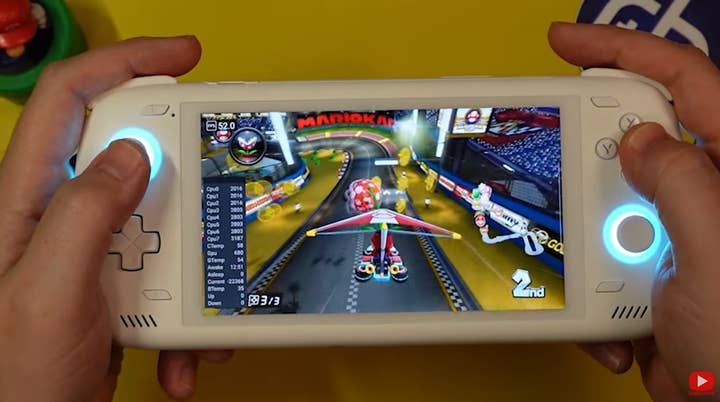
I wonder if the console space could wind up in a similar state eventually, where the arms race is less about who can produce the box capable of running the absolute most expensive-looking games and more about who can deliver the most capable hardware at the most budget-friendly price point, and the platforms we have now are not so intrinsically tied to hardware but simply a layer on top of it.
To answer the question in the heading above, I still believe the console experience – playing console-style games through a box connected to a living room TV – is no more doomed than ever, and will endure into the future.
That said, it's increasingly looking like a lot of things people once assumed to be inherent to the console experience – cartridges and discs, standardized hardware and interfaces, and now exclusive titles – might not survive to see that future. At least not in the form we're used to.
The rest of the week in review
QUOTE | "You can debate the speed we went to build organic growth, but the ambition was obviously to aggressively organically grow the company. Now, we need to adjust for that and that's basically the core of the issue that we are addressing here." – Embracer CEO Lars Wingefors discusses the company's ongoing layoffs in a post-earnings call.
Ah yes, they were growing the company "aggressively organically," you see, because that is not in any way a contradiction in terms. Think of that massive acquisition spending spree in the name of organic growth as the "fooling around" part of the company strategy, and laying off everyone and shuttering renowned studios left and right while struggling to pay down a massive debt is just the "finding out" bit.
Can't say I love Wingefors dismissively referring to the industry-wide layoffs from executive decisions like that as "something that everyone needs to get through."
QUOTE | "Despite the union's efforts to find an acceptable compromise, negotiations hit a wall. In order to hit arbitrary cost reductions targets, management offered a budget dedicated to raises that would be lower than inflation for the second year in a row." - French developer union STJV organized a strike across three Ubisoft studios in the country. It said almost 700 workers participated in the strike.
STAT | 4 – The number of companies that reported growing sales this week: Bandai Namco, Starbreeze, Embracer, and Sony.
STAT | 5 – The number of stories about company layoffs or closures this week, with Daybreak, ZA/UM, Scopely, and Blackbird Interactive downsizing while Threshold Games shut down entirely.
QUOTE | "For true change, accessibility can't be a checkbox exercise. The worry is that, for many, 'accessibility' is being used to virtue-signal in the same way as 'corporate social responsibility' was a decade ago. That disconnect will always exist while minority communities are only considered as target customer groups rather than both players and participants in the games industry." – Accessibility advocates Natalie Burns and Améliane Chiasson in a guest article on the need to empower everyone to play.
STAT | 17% - The portion of gamers who self-identify as LGBTQ, according to a survey by Nielsen and GLAAD.
QUOTE | "I found out about the Black in Gaming Foundation and [discovered] that there are other people around me. Not just close to me, [but people] I can actually interact with and talk to." – In a Black Voices Progress Report article, a QA worker explains what renewed their passion for staying in the industry after years at a company with representation issues where they had few opportunities to interact with other Black people in the workplace.
QUOTE | "I think it's kind of hard because you don't want to tell young people that the industry has a really big race problem and that once they're a certain shade, it's going to be infinitely more difficult, but you also don't want to sugarcoat it and say everything's great." – In another Black Voices Progress Report article, Spirit Swap: Lo-Fi Beats To Match-3 To developer Adanna Nedd grapples with whether to encourage young game developers of color or prepare them for hardship.
STAT | 108 – The number of characters in Suikoden that can be on the player's side, to give some sense of the scope of story the PSone RPG had. We learned this week that the game's director, Yoshitaka Murayama, died earlier this month of complication from an ongoing illness. He had finished work on his last game, Eiyuden Chronicle: Hundred Heroes, a crowdfunded spiritual successor to Suikoden that is set to release in April.
QUOTE | "I don't even know what to say still other than Adam was such a beautifully kind person with so much patience despite his immense talent. He was so egoless that few would know how much he added to everything [League of Geeks] created." – Kepler Interactive's Lisy Kane eulogizes League of Geeks founding member Adam Duncan.
